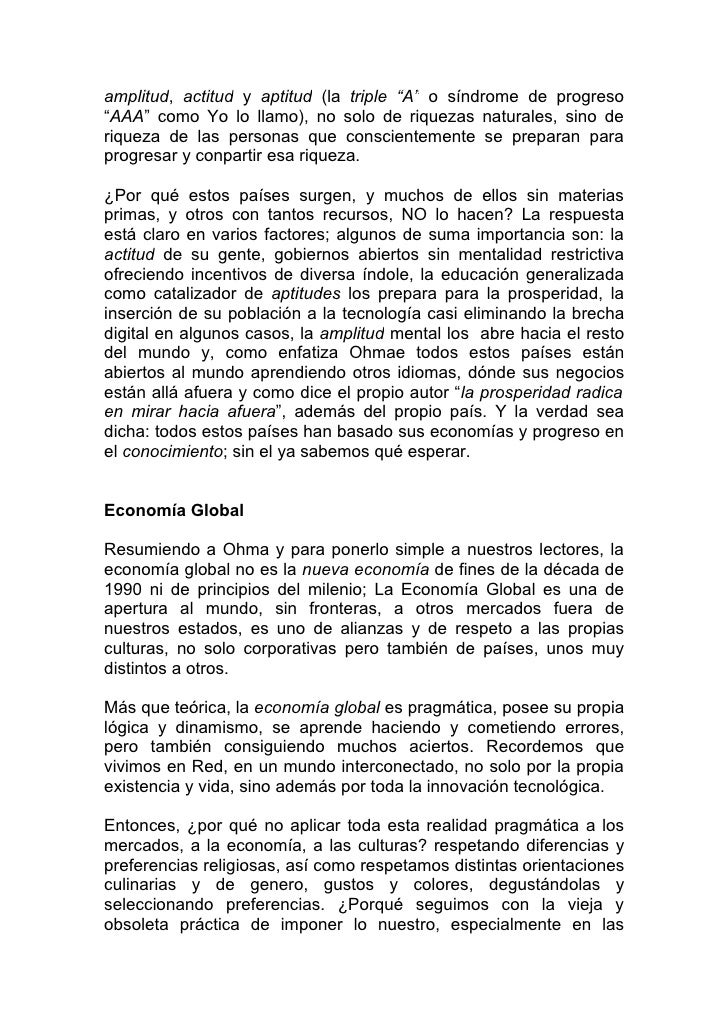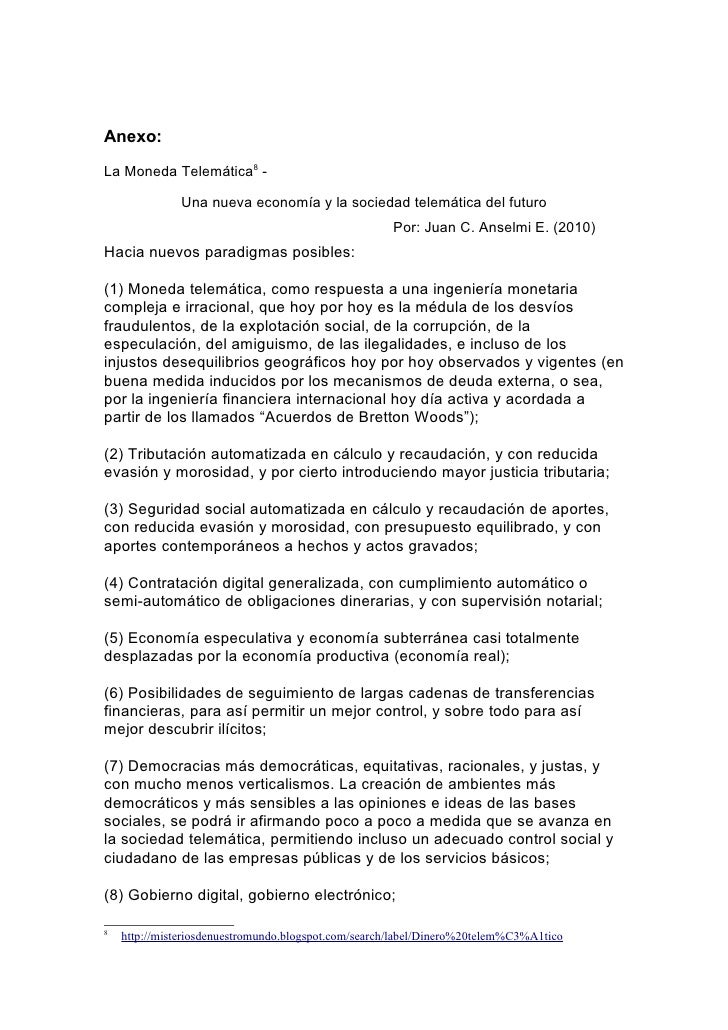El Proximo Escenario Global Kenichi Ohmae Pdf
Kenichi Ohmae, The End of the Nation-State: the Rise of Regional Economies. New York: Simon and Schuster Inc., 1995.


Books by management and economics gurus rarely touch on matters of significance to students of nationalism. Kenichi Ohmae's most recent work, The End of the Nation-State, is a pleasant exception to this trend.
Building on his earlier Borderless World (1990), this Tokyo-based author has written a short, fast-paced piece. Ohmae's background is highly relevant to his work.
He is a former senior partner with McKinsey and Company management consultants and has worked with numerous corporations and governments worldwide. He is also the chairman of Reform of Heisei, a 35,000-member citizens movement dedicated to reforming Japan's political system. Ohmae's thesis can be broken down into two parts: a descriptive 'is' component and a normative 'ought' component. The descriptive thesis is that the nation-state is becoming obsolete because it is no longer the optimal unit for organizing economic activity. If true, this would deal a major blow to the rationale behind nations, because one of the main impulses behind nation-building was the bourgeois desire to have a field of order in which markets, people and resources could be controlled and harnessed for stable industrial activity. Ohmae asserts that such a field is now unnecessary because the important economic decisions are taken at the level of the economic region, regions (such as Hong-Kong-South China or Southern OntarioMichigan) which often cross national boundaries.
Furthermore, such regions now have the ability to 'plug in' to the global economy to source the capital, labour and resources they need to prosper. In effect, such regions are economically independent of the nation-states in which they reside. What is more, the nationally-dependent region often pays more for its inputs than the globally-dependent. This explains why Singapore has cheaper agricultural products and construction materials than Osaka-Kansai even though Singapore has no farms or quarries.
(p.13) Ohmae goes on to mention that nation-states were once needed to provide the 'four I's' of economic growth: investment, industry, information and individuals. However, the communications revolution has changed all this.
For instance, a firm in an economic region can source its capital in London, locate its industrial plant in Malaysia, tap information from a database in Tokyo and hire individuals in California to design factory layouts. This has been enabled by computerized information, which when linked to digital communication, has performed what Anthony Giddens would call an intertwining of the local and the global. Since it is detached from its geographical moorings, economic activity is now free to locate in the most favourable regional climate it can find, and Ohmae indicates that the global economy disciplines poor national economic climates by avoiding them: electronically transferring production to less regulated, low-cost nations and capital to stable, low-tax regions. Ohmae's assertion that the state is losing control of economic activity is backed up by a more contentious claim: that there exists a globalization ('California-ization') of culture. Here Ohmae asserts that in those societies open to multimedia, the change has begun. In his words, 'children and teenagers are, at deep levels of sensibility and worldview, becoming much more like their counterparts in other societies similarly influenced than they are like the older generations within their own cultures. The essential continuity between generations, on which every society necessarily depends for its integrity and survival, has begun to fray.
El Proximo Escenario Global Kenichi Ohmae Pdf Download
This frayingthis tilting of the balance-can, perhaps, be most clearly seen in the context of the recent social history of Japan.' 30) Far from deploring the loss of Japanese social 'integrity' or worrying about the threats to the survival of Japanese society, Ohmae welcomes the changes brought by multimedia and, echoing the position of evolutionary liberals, he suggests that nationalism must be reduced if not eliminated to improve the quality of life of the world's individuals.
He argues that nationalism is a cover for bureaucratic expansion and the protection of inefficient industries and leads to demands for equity from political regions that act as a drag on the dynamic economic regions which drive economies. At first glance, there is much to recommend in Ohmae's position. As regards his descriptive thesis, the internationalization of corporate activity, the independence of economic regions from their parent nations and the spread of a global consumer culture are welldocumented realities in the developed countries. On the normative side, Ohmae's contention that the political demands of nationalism hinder economic growth also seems plausible-a view echoed by many development economists and by social scientists like Mancur Olson. These very real strengths cannot, however, obscure several very real problems with Ohmae's analysis.

Though he would be shocked by the suggestion, Ohmae's first omission owes a great debt to Marxism: the view of the individual as an economically-determined agent. Here Ohmae implies that individuals can satisfy all of their needs for 'well-being' in the global marketplace.
This is a horrendous simplification that ignores a class of goods that cannot be priced and which economists like to bury in appendices and footnotes under the label 'nonpecuniary'. 'Non-pecuniary' goods, like a feeling of historical rootedness or a sense of immortality, cannot be priced, packaged and produced in a global marketplace. It just so happens that nations are a major source of these non-market goods, goods essential to people's wellbeing. Hence, while the elimination of nations may increase people's consumption of marketed goods, it will eliminate crucial non-market goods and lead to less well-being, not more. The presence of persistent anomie and social dysfunction in the developed world should have served to dampen Ohmae's optimism, but he has shown little inclination to acknowledge the social costs of his borderless world. Another problem with the analysis concerns Ohmae's desire to see economic regions freed of national influence.
It is certainly true that if nations released economic regions from the burden of equity, more wealth would be produced. Then again, the same would hold for releasing dynamic industries and individuals from the imperatives of national redistribution. Nevertheless, all these laissez-faire solutions must come to grips with the equity problem. If Ohmae wants more regional autonomy, he must suggest an alternate method (perhaps higher income tax) of maintaining equity. Of course, Ohmae would probably reply that individuals should move to dynamic regions (he never actually says this), but again, he provides no accounting for the social costs of such dislocation. In summary, Ohmae's work contains some noteworthy descriptions and some worthwhile recommendations that can enrich scholars' understanding of the much neglected economics of nationalism.
Kenichi Ohmae Quotes
The flipside of this coin is that the book is sociologically weak. On this point, some good bedside reading for Mr. Ohmae might be Anthony Smith's Nations and Nationalism in a Global Era. ERIC KAUFMANN Department of Sociology, London School of Economics and Political Science.